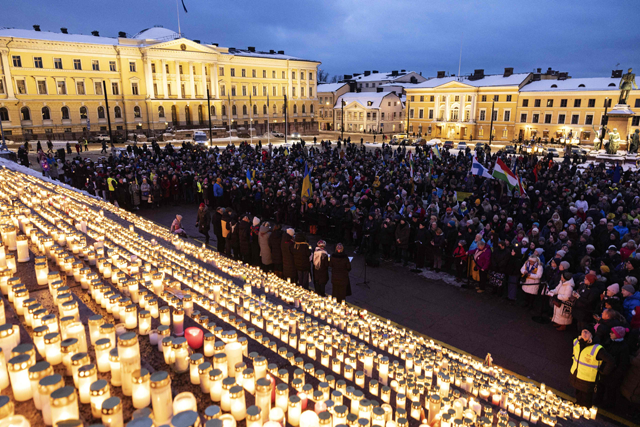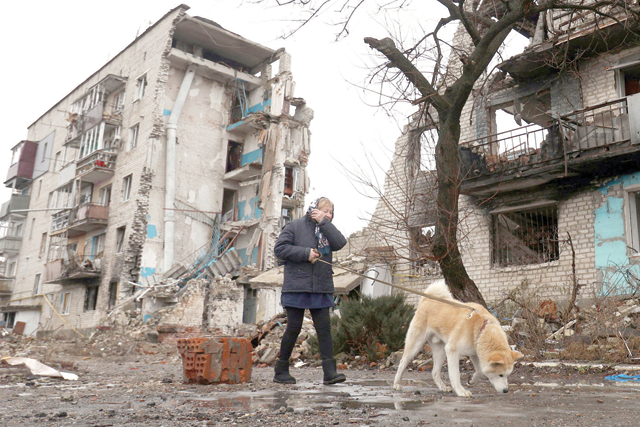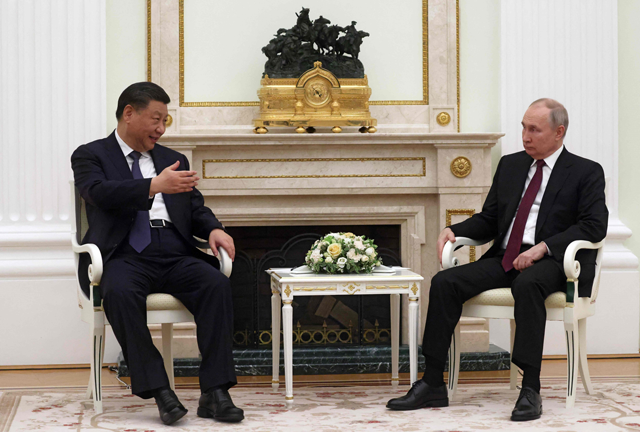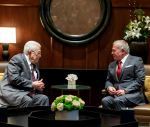You are here
China urges Russia-Ukraine talks, UN supports no nukes clause
By AFP - Feb 25,2023 - Last updated at Feb 25,2023

People gather as hundreds of candles are lit for a commemoration called 'Light to Ukraine' for the victims of the war in Ukraine at Senate Square in Helsinki, on Friday (AFP photo)
BEIJING/ BRUSSELS — China called Friday for urgent peace talks as it released its plan to end the war in Ukraine, but several Western powers rebuffed the proposals while warning against Beijing's closening ties to Moscow.
The United Nations expressed cautious optimism over the Chinese proposals, particularly over the document's call to avoid using nuclear weapons.
Russia reacted positively to Beijing's efforts and Ukrainian President Volodymyr Zelensky offered a muted response, saying Kyiv needed to "work with China" on approaches to put an end to the year-old war.
Zelensky told reporters he was planning to meet with Xi Jinping after the Chinese leader's government called for the peace talks, saying it would "be important for world security".
China's 12-point paper calling for a "political settlement" of the crisis follows accusations from the West that China is considering arming Russia, a claim Beijing has dismissed as false.
Timed to coincide with the first anniversary of Russia's invasion of Ukraine, the paper urges all parties to "support Russia and Ukraine in working in the same direction and resuming direct dialogue as quickly as possible".
It also makes clear its opposition to not only the use of nuclear weapons, but the threat of deploying them, after Russian President Vladimir Putin threatened to use Moscow's atomic arsenal in the conflict.
Russia said Friday it appreciated Beijing’s efforts to settle the conflict but insisted any solution should recognise Kremlin control over four Ukrainian regions.
“We highly value the sincere desire of our Chinese friends to contribute to the settlement of the conflict in Ukraine through peaceful means,” the foreign ministry said, but added any settlement must recognise “the new territorial realities”.
China’s document was immediately met by scepticism from Ukraine’s allies, with NATO chief Jens Stoltenberg saying Beijing “doesn’t have much credibility because they have not been able to condemn the illegal invasion of Ukraine”.
“Putin is applauding it, so how could it be any good?” US President Joe Biden told ABC in an interview broadcast Friday.
And German President Frank-Walter Steinmeier said that while “every constructive suggestion that brings us closer on the path to a just peace is highly welcome... whether global power China wants to play such a constructive role is still doubtful”.
At a press conference in Beijing, Ukrainian and EU diplomats urged China to do more to press Russia to end the conflict.
Jorge Toledo, the EU ambassador to China, said Beijing has a “special responsibility” as a permanent member of the UN Security Council to uphold peace.
At the United Nations, Secretary-General Antonio Guterres’s spokesman said “I think the call on the need to avoid the use of nuclear weapons is particularly important.”
Strategic allies
China has sought to position itself as a neutral party in the conflict while maintaining close ties with strategic ally Russia.
Top Chinese diplomat Wang Yi on Wednesday met with Putin and Russia’s foreign minister, Sergei Lavrov, in Moscow.
A meeting readout published by Chinese state news agency Xinhua quoted Wang as saying China was willing to “deepen political trust” and “strengthen strategic coordination” with Russia.
Since Russian tanks rolled into Ukraine, China has offered Putin diplomatic and financial support, but refrained from overt military involvement or sending lethal arms.
“I don’t anticipate a major initiative on the part of China providing weaponry to Russia,” Biden told ABC. “We’d impose severe sanctions on anyone who has done that.”
Leaders at a virtual Group of Seven (G-7) summit on Friday also warned countries they will face “severe costs” if they continue helping Russia evade international sanctions imposed over its invasion.
The EU agreed a new round of sanctions over Russia’s war in Ukraine on Friday, the one-year anniversary of Moscow’s invasion, the bloc’s Swedish presidency announced.
The package, the 10th the EU has imposed since Russia’s February 24, 2022 invasion, contains, it said, “targeted restricted measures against individuals and entities supporting the war, spreading propaganda or delivering drones used by Russia in the war”.
Final approval of the sanctions was expected early Saturday if no EU country raises a last-ditch objection.
The details on the listed individuals and entities will then be published in the European Union’s official gazette.
One EU diplomat told AFP that 120 individuals and entities, and three more Russian banks, were listed.
The EU’s measures echoed sanctions announced earlier on Friday by the United States and by Britain, and came in the wake of a G-7 statement that warned of penalties for any country abetting Russia in its war.
Another EU diplomat said the agreement on sanctions held “no compromise” to a proposal put forward to member states by the European Commission.
That proposed package promised to cut off industrial goods worth 11 billion euros ($12 billion) to Russia and target drone producers in Iran whose unmanned aircraft containing warheads Moscow has been using to attack Ukrainian targets.
Commission chief Ursula von der Leyen had said the goods put under sanctions for Russia would include electronics and machine parts that can be used in Russian drones, missiles, helicopters and other weapons systems.
She had said that seven Iranian entities providing dual-use products to Russia were also included in the commission sanctions proposal.
The EU has already imposed nine waves of unprecedented sanctions on Moscow, hitting key Russian exports like oil in a bid to cut Russian President Vladimir Putin’s war chest.
Several EU diplomats had told AFP that complaints from Poland had slowed down agreement on the latest sanctions because Warsaw had viewed them as insufficient.
Polish Prime Minister Mateusz Morawiecki said Friday, as he visited Kyiv before the EU sanctions agreement was announced, that the proposals from Brussels were “too soft, too weak”.
Related Articles
KYIV — French President Emmanuel Macron said Saturday he would visit China in April, and urged Beijing to pressure Russia to end the war in
MOSCOW — President Vladimir Putin told his Chinese counterpart Xi Jinping on Monday that Russia was open to discussing China's proposals to
MOSCOW — The Kremlin said on Wednesday that China would back Russia over its security concerns with the West when President Vladimir Putin v


















